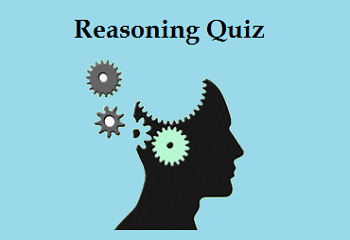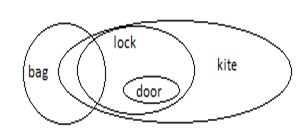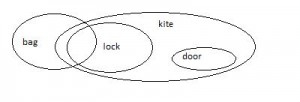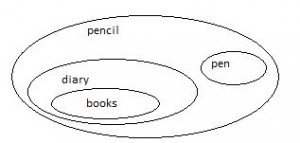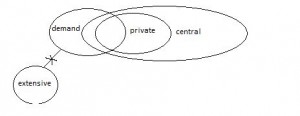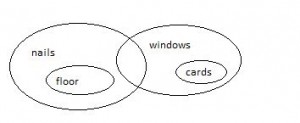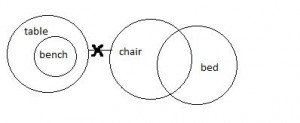Hello Aspirants. Welcome to Online Reasoning Section with explanation in AffairsCloud.com. Here we are creating Best question samples from Syllogism with explanation, which is common for competitive exams. We have included Some questions that are asked in previous exams !!!
Questions penned by Yogit
- Statements: Some bags are locks. All locks are kites. Some doors are kites.
Conclusions: – 1) At least some bags are doors 2) All doors being locks is a possibility
1) If only conclusion I follows.
2) If only conclusion II follows.
3) If either conclusion I or II follows.
4) If neither conclusion I nor II follows
5) If both conclusions I and II followAnswer – 2) If only conclusion II follows
Explanation :
- Statements: Some bags are locks. All locks are kites. Some doors are kites.
Conclusions: – 1) All doors being kites is a possibility 2) Some bags are kites.
1) If only conclusion I follows.
2) If only conclusion II follows.
3) If either conclusion I or II follows.
4) If neither conclusion I nor II follows.
5) If both conclusions I and II followAnswer – 5) If both conclusions I and II follow
Explanation :
- Statements: All books are diary. No diary is a pen. All pens are pencils.
Conclusions: – 1) No book is a pen 2) All books being pencils is a possibility
1) If only conclusion I follows.
2) If only conclusion II follows.
3) If either conclusion I or II follows.
4) If neither conclusion I nor II follows.
5) If both conclusions I and II followAnswer – 5) If both conclusions I and II follow
Explanation :
- Statements: All books are diary. No diary is a pen. All pens are pencils.
Conclusions: – 1) No pencil is a book 2) all diary being pencils is a possibility
1) If only conclusion I follows.
2) If only conclusion II follows.
3) If either conclusion I or II follows.
4) If neither conclusion I nor II follows.
5) If both conclusions I and II followAnswer – 2) If only conclusion II follows
Explanation :
- Statements: All lyrics are poems. All poems are rhymes. No rhyme is a paragraph
Conclusions: – 1) No lyric is a paragraph 2) No poem is a paragraph
1) If only conclusion I follows.
2) If only conclusion II follows.
3) If either conclusion I or II follows.
4) If neither conclusion I nor II follows.
5) If both conclusions I and II followAnswer – 5) If both conclusions I and II follow
Explanation :
- Statements: All lyrics are poems. All poems are rhymes. No rhyme is a paragraph
Conclusions: – 1) All rhymes are poems 2) All lyrics are rhymes
1) If only conclusion I follows.
2) If only conclusion II follows.
3) If either conclusion I or II follows.
4) If neither conclusion I nor II follows.
5) If both conclusions I and II followAnswer – 2) If only conclusion II follows
Explanation :
- Statements: Some demands are private. No demand is extensive. All private are central
Conclusions: – 1) Some demands are central 2) Some extensive are private
1) If only conclusion I follows.
2) If only conclusion II follows.
3) If either conclusion I or II follows.
4) If neither conclusion I nor II follows.
5) If both conclusions I and II followAnswer – 1) If only conclusion I follows
Explanation :
- Statements: All floors are nails. Some nails are windows. All cards are windows
Conclusions: – 1) Some nails are cards 2) At least some windows are floors
1) If only conclusion I follows.
2) If only conclusion II follows.
3) If either conclusion I or II follows.
4) If neither conclusion I nor II follows.
5) If both conclusions I and II followAnswer – 4) If neither conclusion I nor II follows
Explanation :
- Statements: All houses are streets. Some streets are trees. No tree is a plant
Conclusions: – 1) No plant is a tree 2) All streets s are trees
1) If only conclusion I follows.
2) If only conclusion II follows.
3) If either conclusion I or II follows.
4) If neither conclusion I nor II follows.
5) If both conclusions I and II followAnswer – 1) If only conclusion I follows.
Explanation :
- Statements: – No table is chair. Some chairs are bed. All benches are tables.
Conclusions: – 1) No table is bench 2) No chair is bench
1) If only conclusion I follows.
2) If only conclusion II follows.
3) If either conclusion I or II follows.
4) If neither conclusion I nor II follows.
5) If both conclusions I and II followAnswer – 2) If only conclusion II follows.
Explanation :
Note: Dear Readers if you have any doubt in any chapter in Reasoning you can ask here. We will clear your doubts
AffairsCloud Recommends Oliveboard Mock Test
AffairsCloud Ebook - Support Us to Grow
Govt Jobs by Category
Bank Jobs Notification


